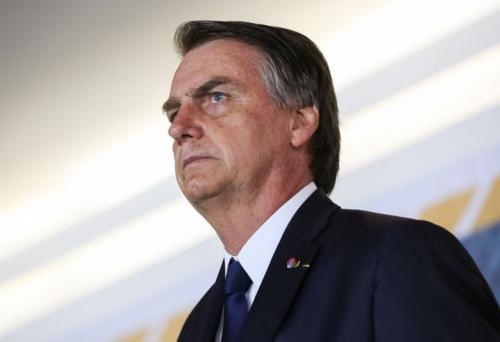Why Bolsonaro will not go to Buenos Aires
Bolsonaro knows that the new government of Argentina is moving in an exactly opposite direction to that of his government.
- Opinión

The President of Brazil, Jair Bolsonaro, has announced that he will not go to the investiture of Argentine President Alberto Fernández and Vice-President, Cristina Kirchner, to take place this coming December 10. Traditionally the Presidents of the two countries have attended the inauguration ceremony of their colleagues; moreover, their first foreign visit was to the neighboring country.
The announcement of the President of Brazil was made after his declarations with respect to the Argentine elections, expressing his hopes that the winning candidates would not triumph; and since the adverse result had come about, he followed up with his declarations that the Argentines had been mistaken and that they would repent. He says this from a government that has lost 2/3 of its electoral support, won in an election campaign marked by manipulation using robots and fake news. He affirms this, as if his absence would eclipse the ceremony of investiture, as if his absence would be noted and lamented.
On the contrary, the foreign minister of the government of Maurice Macri immediately rejected the words of Bolsonaro, even before the newly elected President of Argentina did the same. However, why did Bolsonaro decide not to go to the investiture of the new government of the Brazil’s principal economic and political partner?
First and foremost, because he can imagine the kind of reception that he would have if he went. His image abroad is the most strongly rejected of all those that exist in the world today, personifying the worst of everything. From his responsibility for the forest fires in the Amazon, to the oil contamination of the beaches of the North East of Brazil, without the government having attempted, in any of these cases, to combat the ecological catastrophes. On the contrary, he has tried to take advantage of the disasters to expel indigenous peoples from the Amazon Basin, or to attempt to blame the Venezuelan government for the contamination of Brazilian beaches with oil.
As if this were not enough, the President of Brazil stands out for his positions disqualifying defenders of human rights, of women’s rights, black people, LGBT people and ecologists. Similarly, he is known for his policy of expropriation of workers’ rights and of resources for social policies, for intensifying the privatization of public resources. Moreover, in international policy, he has actively taken part in actions to isolate the Venezuelan regime.
Bolsonaro knows that the new government of Argentina is moving in an exactly opposite direction to that of his government. Fernández has already indicated that he will leave the group of Lima, that was set up to act against the government of Venezuela. The new Argentine rulers were elected on a radical critique of the similar economic models of Macri and Bolsonaro and its disastrous social impacts, with economic stagnation and record rates of unemployment in both countries.
The present President of Brazil was quite rattled by the visit that Alberto Fernández made to Lula, even before his election as the new President of Argentina, and his repeated references to “Lula Libre” (free Lula), as well as the messages from Lula to the new rulers of Argentina. He knows the relations between Argentina and Brazil were never so good as when Lula and Nestor Kirchner established agreements that led to the period of greatest strengthening of the processes of regional integration and economic exchange between the two countries.
Bolsonaro knew that, on the same day on which the Chamber of Deputies of Brazil voted the impeachment of Dilma Rousseff, she received a telephone call from Mauricio Macri expressing his solidarity. He knows that when Macri received him in the Casa Rosada, he was uneasy, and pronouncements were heard that even the Argentine right could not tolerate.
The current President of Brazil could imagine how his reception in Buenos Aires would be, in the midst of the biggest contemporary democratic celebration of the region that will mark the investiture of Alberto Fernández and Cristina Kirchner. Imagine how his figure, his presence, would be the concentrated target of repudiation of everything that he represents, as well as the exaltation of “Lula Libre.”
For all this, Bolsonaro has said that he will not go to the investiture, to which, in passing, he was never invited and he would be an unwelcome guest, dislocated, out of context, in a fiesta that consecrates quite the opposite to what he and his government represent.
(Translated for ALAI by Jordan Bishop)
November 1 2019
- Emir Sader, Brazilian Sociologist and Political Scientist, is the Coordinator of the Laboratorio de Políticas Públicas of the Universidad Estadual de Rio de Janeiro (UERJ).
Del mismo autor
- Hay que derrotar políticamente a los militares brasileños 07/04/2022
- China y Trump se fortalecen 04/03/2022
- Pandemia e Ucrânia aceleram decadência da hegemonia norte-americana no mundo 28/02/2022
- Pandemia y Ucrania aceleran la decadencia de la hegemonía norteamericana en el mundo 28/02/2022
- La anti-política generó la fuerza de extrema derecha 22/02/2022
- Las responsabilidades del PT 10/02/2022
- Estados Unidos, más aislado que nunca en América Latina 03/02/2022
- Memoria y olvido en Brasil 27/01/2022
- 2022: tiempos decisivos para Brasil y Colombia 05/01/2022
- Brasil: una historia hecha de pactos de élite 18/12/2021








